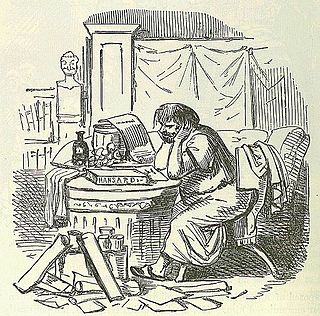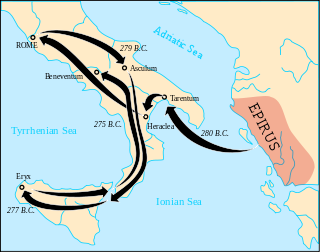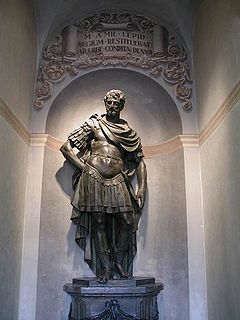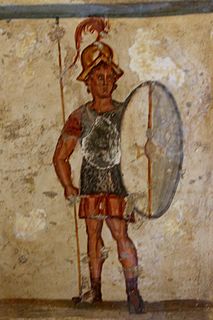Charops or Charopus is the name of two statesmen in 2nd century BC of the Epirote League, grandfather and grandson; both of them had the patronymic Machatas.
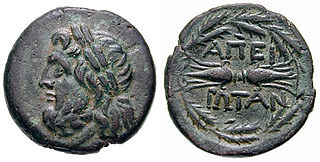
The Epirote League was an ancient Greek coalition, or koinon, of Epirote tribes.
The grandfather sided with the Romans in their war with Philip V of Macedon, and, by sending a shepherd to guide a portion of the Roman army over the heights above the position of the Macedonians, enabled Flamininus to dislodge Philip from the defile which he had occupied in Epirus in 198 BC. In 192 BC, Charops was sent by his countrymen on an embassy to Antiochus the Great, who was wintering at Chalcis in Euboea. He represented to the king that the Epirotes were more exposed to the attacks of the Romans than any of the inhabitants of the rest of Greece, and begged him therefore to excuse them from siding with him unless he felt himself strong enough to protect them. He continued to the end of his life to cultivate the friendship of the Romans, and sent his grandson Charops to Rome for education after his son Machatas died.

Philip V was king (Basileus) of the ancient Kingdom of Macedonia from 221 to 179 BC. Philip's reign was principally marked by an unsuccessful struggle with the emerging power of the Roman Republic. He would lead Macedon against Rome in the First and Second Macedonian Wars, losing both but allying with Rome in the Roman-Seleucid War towards the end of his reign.
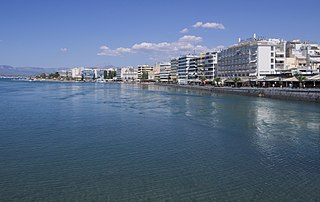
Chalcis or Chalkida is the chief town of the island of Euboea in Greece, situated on the Euripus Strait at its narrowest point. The name is preserved from antiquity and is derived from the Greek χαλκός, though there is no trace of any mines in the area. In the late Middle Ages, it was known as Negropont(e), an Italian name that has also been applied to the entire island of Euboea.
The grandson received his education at Rome, and after his return to his own country adhered to the Roman cause; but here ends all resemblance between himself and his grandfather. It was this younger Charops by whose calumnies Antinous and Caphalus were driven in self-defence to take the side of Perseus; and he was again one of those who flocked from the several states of Greece to Aemilius Paullus at Amphipolis, in 167 BC, to congratulate him on the decisive victory at Pydna in the preceding year, and who seized the opportunity to rid themselves of the most formidable of their political opponents by pointing them out as friends of Macedonia, and so causing them to be apprehended and sent to Rome. The power thus obtained Charops in particular so barbarously abused, that Polybius has recorded his belief that there never had been before and never would be again a greater monster of cruelty. But even his cruelty did not surpass his rapacity and extortion, in which he was fully aided and seconded by his mother, Philotis (or Philota). His proceedings, however, were discountenanced at Rome, and when he went thither to obtain the senate's confirmation of his iniquity, he not only received from them an unfavourable and threatening answer, but the chiefmen of the state, and Aemilius Paullus among the number, refused to receive him into their houses. Yet on his return to Epirus he had the audacity to falsify the senate's sentence. The year 157 BC is commemorated by Polybius as one in which Greece was purged of many of her plagues : as an instance of this, he mentions the death of Charops at Brundisium.
Antinous was a chief among the Molossians in Epirus, who became involved, against his own will, in the Third Macedonian War of Perseus of Macedon against the Romans.
Alkemachos, son of the elder Charops, was a winner in diaulos (~400-metre race) in Panathenaics 190/189 BC. Demetrius, son of Machatas and brother of Charops the elder was in the service of Ptolemy V Epiphanes. The family belonged to the tribe of Thesprotians.
Diaulos was a double-stadion race, c. 400 metres , introduced in the 14th Olympiad of the ancient Olympic Games.
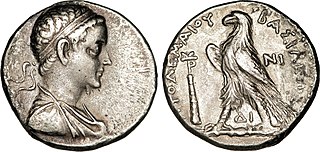
Ptolemy V Epiphanes ; 210–181 BC), son of Ptolemy IV Philopator and Arsinoe III of Egypt, was the fifth ruler of the Ptolemaic dynasty from 204 to 181 BC. He inherited the throne at the age of five, and under a series of regents, the kingdom was paralyzed. The Rosetta Stone was produced during his reign as an adult.
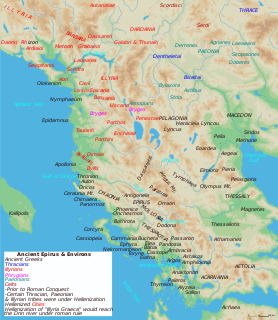
The Thesprotians were an ancient Greek tribe and kingdom of Thesprotis, Epirus, akin to the Molossians. The poet Homer frequently mentions Thesprotia which had friendly relations with Ithaca and Doulichi. On their northeast frontier they had the Chaonians and to the north the kingdom of the Molossians. The Thesprotians originally controlled the Dodona oracle, the oldest in Greece. Later, they were part of the Epirus until they were annexed into the Roman Empire.




